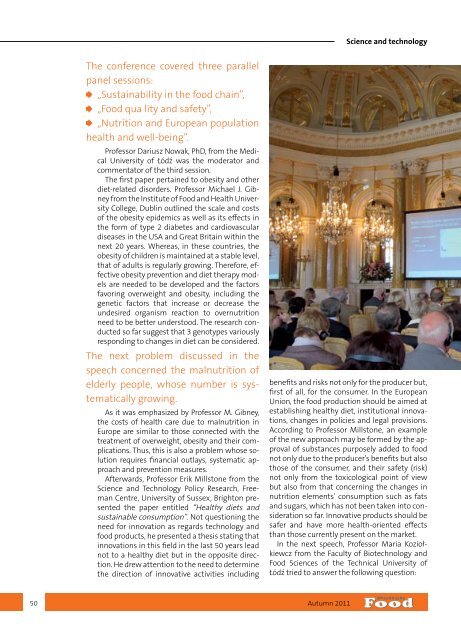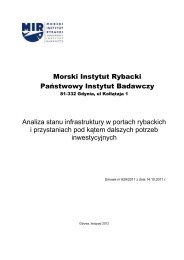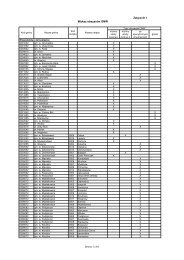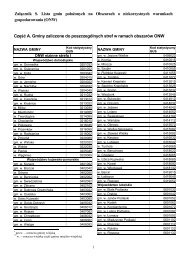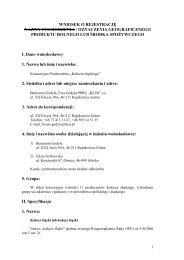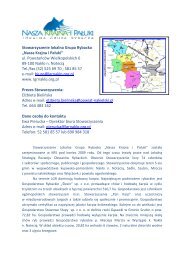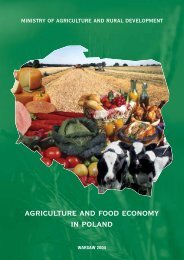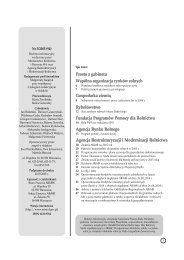download file
download file
download file
Create successful ePaper yourself
Turn your PDF publications into a flip-book with our unique Google optimized e-Paper software.
Science and technology<br />
The conference covered three parallel<br />
panel sessions:<br />
„Sustainability in the food chain”,<br />
„Food qua lity and safety”,<br />
„Nutrition and European population<br />
health and well-being”.<br />
Professor Dariusz Nowak, PhD, from the Medical<br />
University of Łódź was the moderator and<br />
commentator of the third session.<br />
The first paper pertained to obesity and other<br />
diet-related disorders. Professor Michael J. Gibney<br />
from the Institute of Food and Health University<br />
College, Dublin outlined the scale and costs<br />
of the obesity epidemics as well as its effects in<br />
the form of type 2 diabetes and cardiovascular<br />
diseases in the USA and Great Britain within the<br />
next 20 years. Whereas, in these countries, the<br />
obesity of children is maintained at a stable level,<br />
that of adults is regularly growing. Therefore, effective<br />
obesity prevention and diet therapy models<br />
are needed to be developed and the factors<br />
favoring overweight and obesity, including the<br />
genetic factors that increase or decrease the<br />
undesired organism reaction to overnutrition<br />
need to be better understood. The research conducted<br />
so far suggest that 3 genotypes variously<br />
responding to changes in diet can be considered.<br />
The next problem discussed in the<br />
speech concerned the malnutrition of<br />
elderly people, whose number is systematically<br />
growing.<br />
As it was emphasized by Professor M. Gibney,<br />
the costs of health care due to malnutrition in<br />
Europe are similar to those connected with the<br />
treatment of overweight, obesity and their complications.<br />
Thus, this is also a problem whose solution<br />
requires financial outlays, systematic approach<br />
and prevention measures.<br />
Afterwards, Professor Erik Millstone from the<br />
Science and Technology Policy Research, Freeman<br />
Centre, University of Sussex, Brighton presented<br />
the paper entitled “Healthy diets and<br />
sustainable consumption”. Not questioning the<br />
need for innovation as regards technology and<br />
food products, he presented a thesis stating that<br />
innovations in this field in the last 50 years lead<br />
not to a healthy diet but in the opposite direction.<br />
He drew attention to the need to determine<br />
the direction of innovative activities including<br />
benefits and risks not only for the producer but,<br />
first of all, for the consumer. In the European<br />
Union, the food production should be aimed at<br />
establishing healthy diet, institutional innovations,<br />
changes in policies and legal provisions.<br />
According to Professor Millstone, an example<br />
of the new approach may be formed by the approval<br />
of substances purposely added to food<br />
not only due to the producer’s benefits but also<br />
those of the consumer, and their safety (risk)<br />
not only from the toxicological point of view<br />
but also from that concerning the changes in<br />
nutrition elements’ consumption such as fats<br />
and sugars, which has not been taken into consideration<br />
so far. Innovative products should be<br />
safer and have more health-oriented effects<br />
than those currently present on the market.<br />
In the next speech, Professor Maria Koziołkiewcz<br />
from the Faculty of Biotechnology and<br />
Food Sciences of the Technical University of<br />
Łódź tried to answer the following question:<br />
50<br />
Autumn 2011


